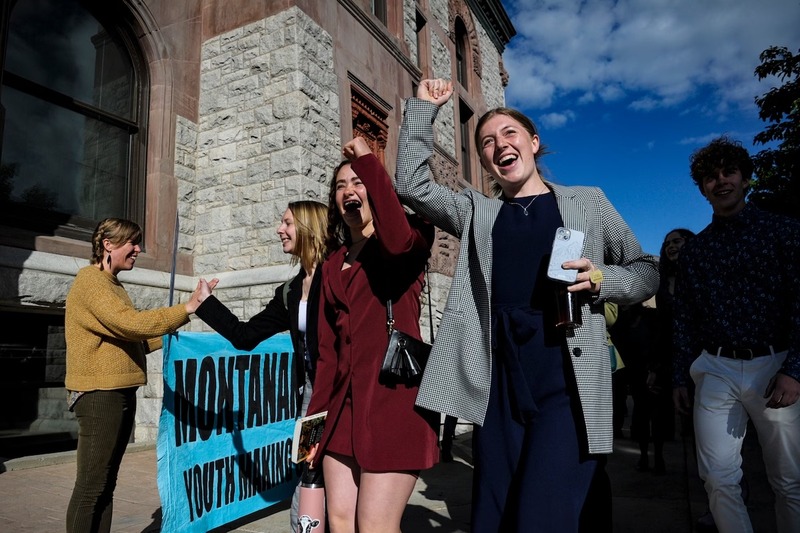Judge rules in favor of Montana youths in landmark climate decision
from WaPo
‘This is a monumental decision,’ said a lawyer for the young plaintiffs, and could influence how judges handle similar cases in other states
The win, experts say, could energize the environmental movement and reshape climate litigation across the country, ushering in a wave of cases aimed at advancing action on climate change.
“People around the world are watching this case,” said Michael Gerrard, the founder of Columbia’s Sabin Center for Climate Change Law.
The ruling represents a rare victory for climate activists who have tried to use the courts to push back against government policies and industrial activities they say are harming the planet. In this case, it involved 16 young Montanans, ranging in age from 5 to 22, who brought the nation’s first constitutional and first youth-led climate lawsuit to go to trial.
Though the cumulative number of climate cases around the world has more than doubled in the last five years, youth-led lawsuits in the United States have faced an uphill battle. Already, at least 14 of these cases have been dismissed, according to a July report from the United Nations Environment Program and the Sabin Center. The report said about three-quarters of the approximately 2,200 ongoing or concluded cases were filed before courts in the United States.
Experts said the Montana youth had an advantage in the state’s constitution, which guarantees a right to a “clean and healthful environment.”
Coal is critical to the state’s economy, and Montana is home to the largest recoverable coal reserves in the country. The plaintiff’s attorneys say the state has never denied a permit for a fossil fuel project.
Across five days of emotional testimony in June, the youths made claims about injuries they have suffered as a result of climate change. A 15-year-old with asthma described himself as “a prisoner in my own home” when isolating with covid during a period of intense wildfire smoke. Rikki Held, the 22-year-old plaintiff for whom the lawsuit is named, detailed how extreme weather has hurt her family’s ranch.
Held testified that a favorable judgment would make her more hopeful for the future. “I know that climate change is a global issue, but Montana has to take responsibility for our part in that,” she said.
Attorneys for the state countered that Montana’s contribution to global greenhouse gas emissions is small. If the law in question were altered or overturned, Montana Assistant Attorney General Michael Russell said, there would be “no meaningful impact or appreciable effect” on the climate.
The state began and rested its defense on the same day, bringing the trial to an unexpectedly early close on June 20. In a pivot from its expected defense disputing the climate science behind the plaintiffs’ case, the state focused instead on arguing that the legislature should weigh in on the contested law, not the judiciary.
Russell derided the case in his closing statement as a “week-long airing of political grievances that properly belong in the Legislature, not a court of law.”
Gerrard said the change in strategy came as a surprise: “Everyone expected them to put on a more vigorous defense,” he said. “And they may have concluded that the underlying science of climate change was so strong that they didn’t want to contest it.”
Though the state is expected to appeal the decision, experts said the favorable verdict for the youths could influence how judges approach similar cases in other states and prompt them to apply “judicial courage” in addressing climate change. The nonprofit law firm Our Children’s Trust, which represents the plaintiffs, has taken legal action on behalf of youths in all 50 states, and has cases pending in four other states.
Juliana v. United States, a 2015 case brought by Our Children’s Trust that drew international attention, is also back on path to trial after facing repeated setbacks. The case took aim at the federal government, alleging that it had violated the 21 youths’ rights to life, liberty and property, as well as failed to protect public trust resources, in taking actions that contribute to climate change.
Plaintiffs’ attorney Phil Gregory said the court’s verdict could empower youth everywhere to take to the courts to secure their futures.
“There are political decisions being made without regard to the best scientific evidence and the effects they will have on our youngest generations,” he said. “This is a monumental decision.”





